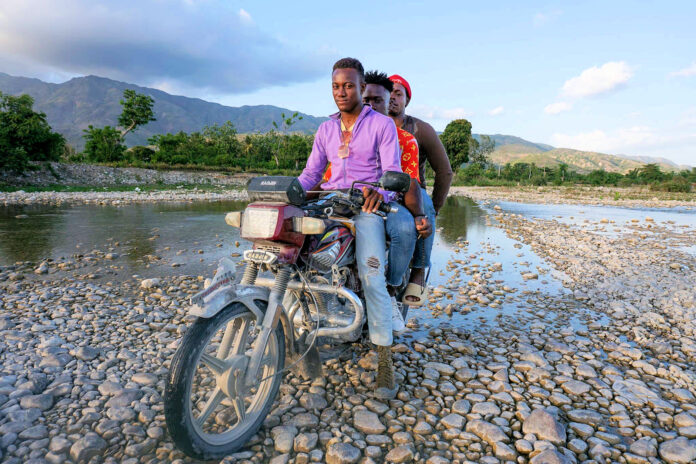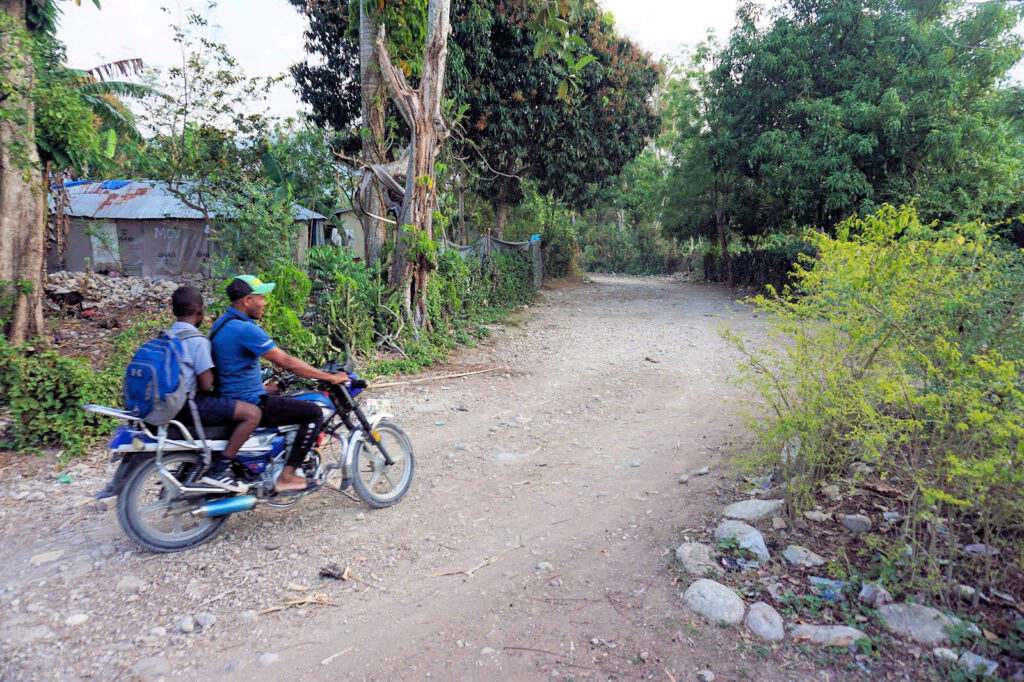
MANICHE, HAITI – Since he graduated from high school, Venel Blanc has been working as a motorcycle taxi driver, using the funds not only to support himself but also to pay his way through college.
The 26-year-old is in his fifth year of studying agronomy at Université Lumière-Les Cayes, to fulfill his lifelong dream of following in his father’s footsteps and becoming a farmer. But the closer he gets to graduating, the more this plan remains a dream.
Blanc says access to credit to start a business is challenging for young people.
“My project to create an agricultural farm in my community remains in the dream stage. Thanks to God, I have my motorcycle to make a living,” adds Blanc, who continues to save in the hope that one day he can set up his own farm.
For many in Maniche, a community of more than 20,000 people, the motorcycle is not only a source of income but also a lifeline. Until 2010, when motorcycles arrived in the mountainous southern commune, residents in Maniche got around on the backs of horses or mules or by walking. Anyone needing medical treatment had to be carried on stretchers to the nearest hospital in Les Cayes, 14 kilometers (almost 9 miles) away. Now around 100 motorbike taxi drivers operate in Maniche, helping children get to school, transporting agricultural products from farms to markets, and even making emergency hospital runs.

“One day I took a pregnant lady to the hospital in Les Cayes,” says Jean Vernet Mauricette, a motorcycle taxi driver in Maniche. “Unfortunately, she lost the baby. I had to return to Maniche with the lady and the dead baby in her arms. That day I understood the scope of the work we do for our clients.”
But with fuel still scarce in Maniche, many motorcycle taxi drivers are not able to run their usual taxi services, leaving residents with fewer transport options. Those who work in this industry are finding it hard to make ends meet, saying they have no alternative way of earning a living. Some dispute this claim, accusing young people of turning their backs on agriculture, an industry they say is the true driving force of Maniche.
After de facto Prime Minister Ariel Henry announced the end of fuel subsidies by his government in September 2022, prompting protests and road blockades throughout the country, fuel has become scarce. An armed group protesting the fuel price hike set up a blockade around the main fuel terminal in Port-au-Prince, preventing the delivery of fuel to gas pumps and aggravating a shortage in the market. Since police regained control of the terminal, fuel has gradually returned to the country’s gas pumps at an irregular rate, with many gas station owners selling gas at inflated prices. The price set by the government is 570 Haitian gourdes per gallon of gas (about 4 United States dollars) and 670 gourdes (about 5 dollars) per gallon of diesel. In Maniche, gas is being sold for around 1,250 gourdes (9 dollars). The high gas prices hurt motorcycle taxi drivers, who are forced to hike their fares or stop working altogether if they can’t earn enough to pay for fuel and make a profit.
Anne Marie Alcidas, a nurse who works with women in remote sections of the commune, says before the motorbike taxis arrived, she could reach only five patients some days, but now she often sees more than 15.
“I am happy to go and bring awareness to these women on family planning methods and to encourage pregnant women to consult a doctor in rural areas now that there are motorcycle taxis,” says Alcidas, who has noticed a reduction in the number of motorbike taxis operating, which makes her job more difficult.
Mauricette, who has been living in a shelter with his family since the August 2021 earthquake that destroyed almost every building in Maniche, says the rising cost of fuel isn’t helping his business.
“This situation is killing me little by little.”
“Staying at home and watching my children, without being able to bring food for them, is killing me,” he says.
The motorbike has offered a way for many young men, who would otherwise be forced out to the bigger cities in search of work, to stay in Maniche.
“Maniche has no factories, no stores, no hotels or restaurants … nothing where young people could get hired; there is agriculture, but I have no money to do it,” says Blanc, whose motorcycle taxi earnings allow him to pay for his college fees and supplies. Any remaining money goes to his parents.
But Cherilet Labossière, a 76-year-old farmer and former member of the board of directors of the Communal Section of Maniche, an administrative division, says young people who go into the motorcycle taxi business instead of farming are contributing to the area’s food scarcity, which is leading to a rise in food costs.
“I raised my four children working the land. I could plant up to 72 pots of beans,” says Labossière, referring to a Haitian measurement of one pot of beans equaling 2.7 kilograms (5.95 pounds). “I always give advice to young people, but they don’t have the patience to work in agriculture.”
“These young people think that making 1,000 to 2,000 gourdes [7 to 14 dollars] a day [working as a motorbike taxi driver] can help them get out of poverty, but they are mistaken,” says Labossière, who has been working on the land since he was a child. They can’t really save, take care of their family properly. Maniche is a community that lives off the land. You have to persevere to succeed.”
Labossière says his farm has provided an education for his four grown children, who do not live in Maniche or work as farmers but help on their father’s farm when they return for vacations.
Mauricette had to leave farming behind because it was too expensive; he had to wait a long time before earning any money. He says the cost of a motorbike, which averages around 150,000 gourdes (about US$1,081) is nothing compared with the cost of equipment needed to start a farm.
“Our elders think that we can start farming without money and that it’s easy. It’s not true. We need money that we don’t have. With the motorcycle, we bring money in every day, and it helps us with our daily expenses,” says Mauricette, who now struggles to get fuel; the nearest gas station is 8 kilometers (5 miles) away in Dolin, and the supply of fuel is not consistent.
Like other motorbike taxi drivers, he continues to hope that fuel will be available regularly at the price set by the government so he can return to the earnings he enjoyed before gas prices went up.
“I would like fuel to be available at the pumps and accessible to everyone,” Mauricette says. “This situation is killing me little by little.”
Rose Hurguelle Point du jour is a Global Press Journal reporter based in Haiti. Megan Spada, GPJ, translated this article from French. An earlier version of this story was originally published by Global Press Journal.









